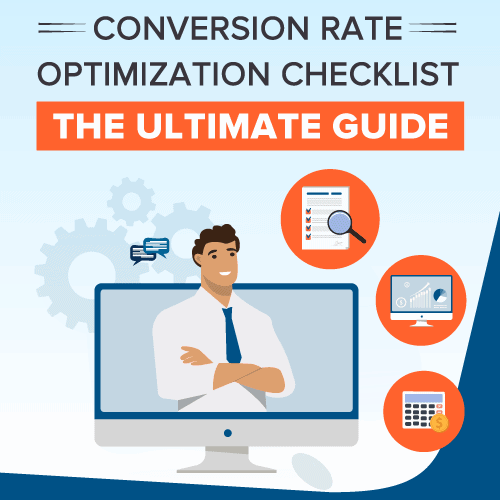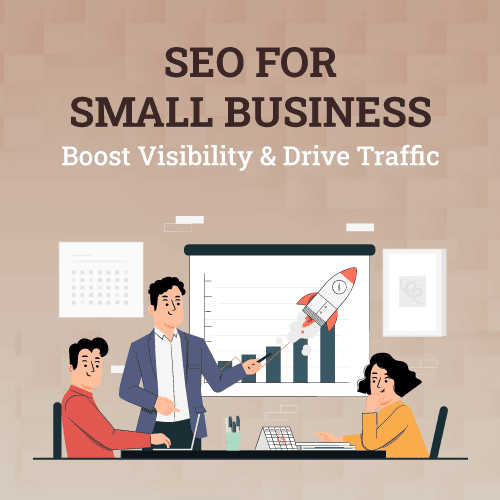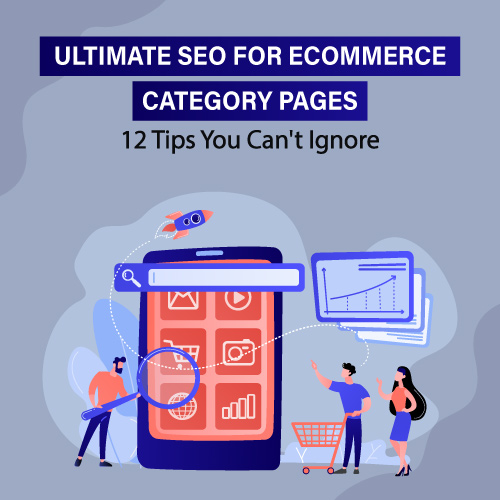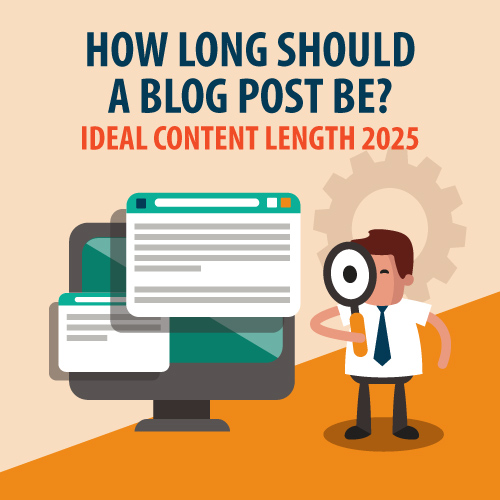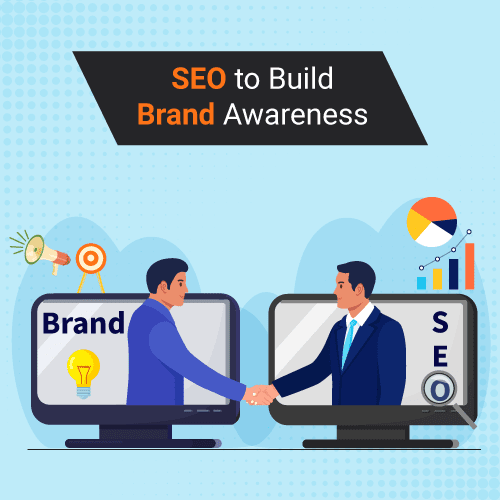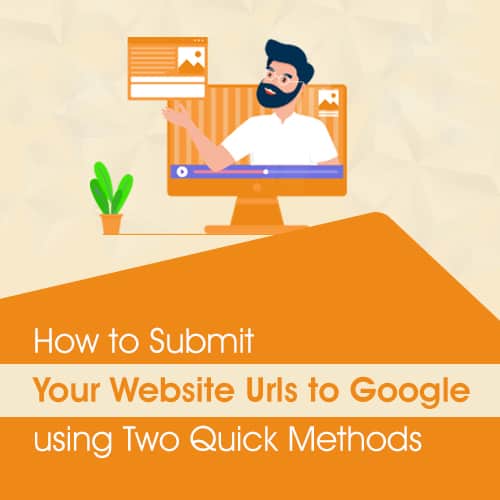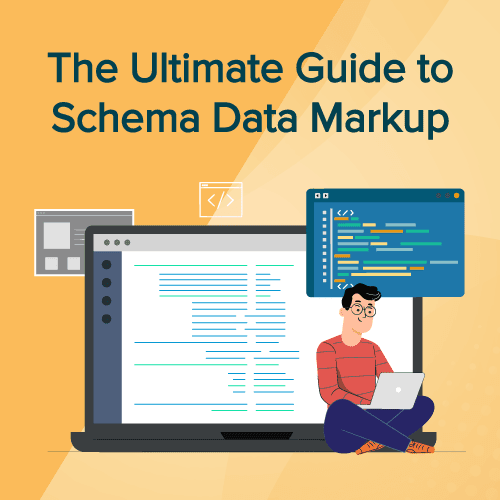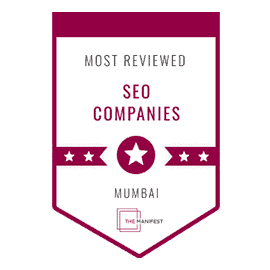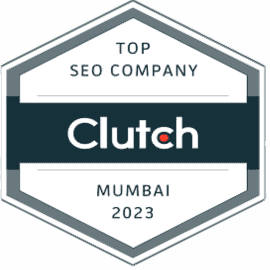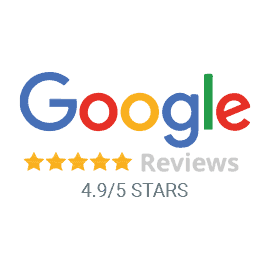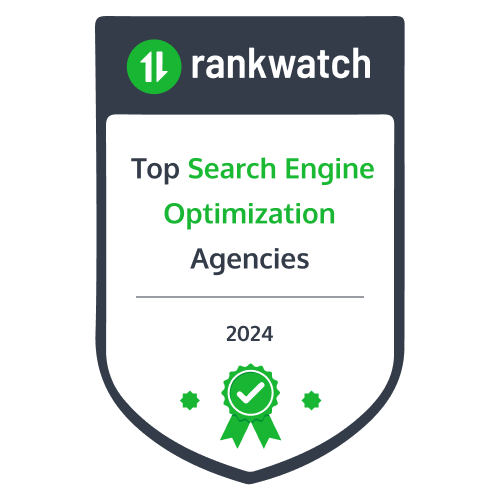
The ever-evolving world of digital marketing offers businesses a wide variety of choices for advertising their brands. SEO (Search Engine Optimisation), and PPC (Pay-Per-Click advertising) are two of the most widely used strategies.
Understanding the subtleties of SEO vs. PPC is critical for making informed decisions that will shape your brand’s online trajectory, whether you’re a new entrepreneur or a seasoned marketer.
Each of these approaches has the ability to significantly impact the growth of your brand, but the question is which SEO Company in Mumbai is appropriate for your specific firm. Let’s delve into the worlds of SEO and PPC in this complete guide, exploring their differences, benefits, and drawbacks, as well as how they may help your brand thrive.
You’ve Finally Found the Right SEO Agency!
Capsicum has the SEO solutions you’ve been searching for. Don’t let another day go by where your competitors are looking down on you! It’s time to be discovered!
Get Started NowWhat are the Metrics for Brand Growth?
There are several indicators for measuring brand growth, but the one you should use depends on your industry and your digital marketing plan. Businesses use a variety of KPIs, or key performance indicators, to assess the effectiveness and success of their brand’s development.
These indicators provide useful insights into different elements of brand success, including, but not limited to, whether the target audience is aware of the brand. Customer sentiment, internet presence, revenue growth, brand equity, and many other factors are all equally important.
A 360-degree view is crucial to understanding and judging the performance, and these metrics will spell out whether the strategies will ensure growth or not. Continuous monitoring is also essential to tweak and optimise the brand’s performance to ensure sustainable and successful growth in the marketplace.
Key Difference Between SEO and PPC
When the question of search engine optimization vs pay per click arises, there are certain factors that make it difficult to choose between the two. Each has its own pros and cons, and as a business evolves, its needs evolve as well.
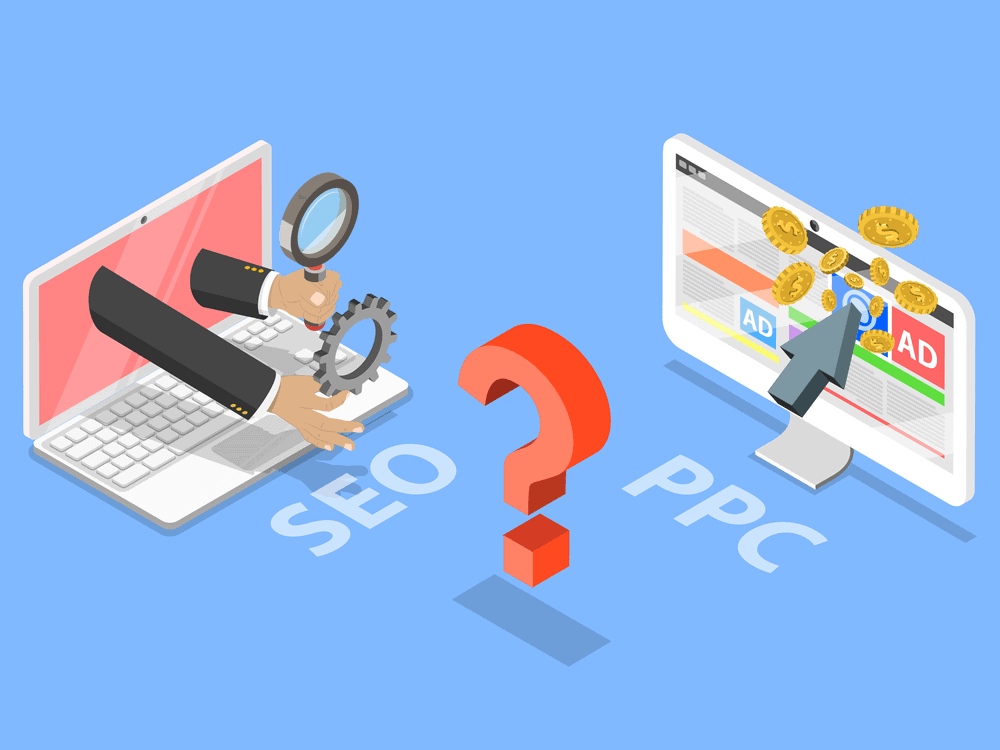
It is crucial to understand which service your business requires at the moment to grow and provide the desired ROI. Let us get into the details of what is PPC and SEO, what is SEO vs PPC, and how each benefits your business.
SEO: Search Engine Optimization
What is SEO?
When you enter a search term or keyword into a Google Search box, you will see a list of results. If you have already logged into your Gmail account or are using the same computer you always do, the search results will be more specific to you.
All search engines collect data required to refine your search results, ensuring you receive the answers you are looking for. They exploit this data to provide optimal search results, thereby elevating your search experience.
SEO, short for Search Engine Optimization, is a digital marketing strategy that allows you to enrich your website with high quality relevant and valuable content.
When you optimise a website with SEO techniques, it helps your website rank higher on search engines. The higher your website ranks on a search engine, the better your business’ visibility and growth. People rarely go past the 1st Google search result page. So, the goal is to be on the 1st page in the top 10 results.
With SEO, you’ll mostly focus on getting long-term organic results.
For example: if you were to search for investment opportunities on Google. The first few results will be advertisements. These are paid results, not organic.
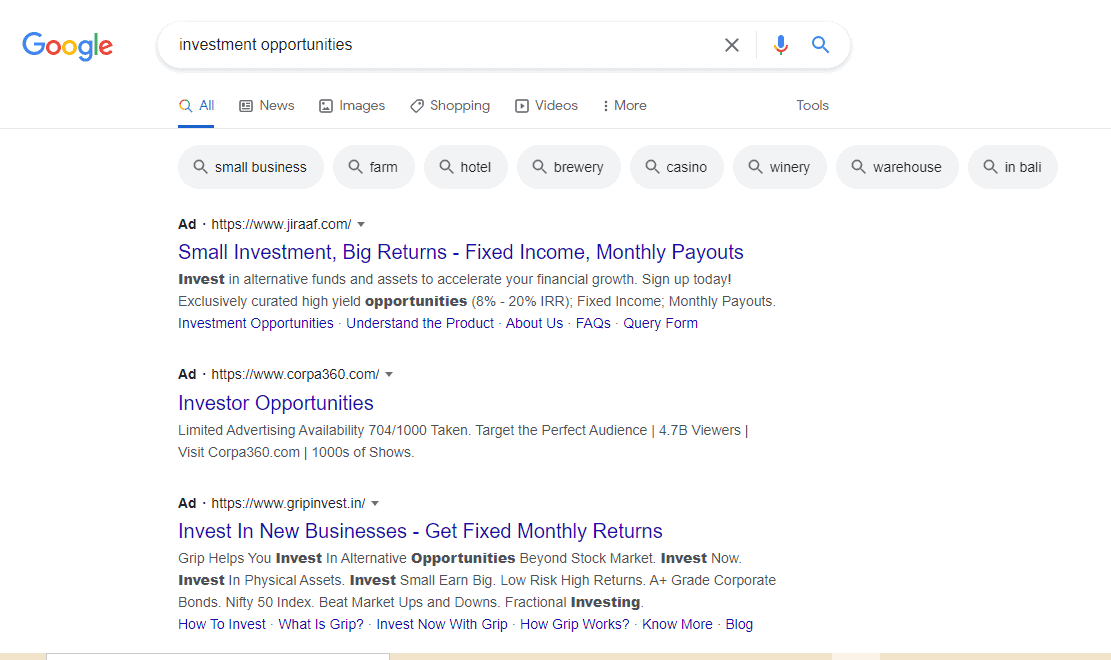
Now, if you were to search for the word Investment, you would probably get the following organic results.

Investing in SEO allows you to rank your business higher on Google with organic results.
How do search engines work?
A typical search engine works by crawling and indexing web pages, followed by organizing the information they find across the web pages, and finally ranking pages based on their relevance and authority. Suppose you enter a search query, and the search engine retrieves and displays results from its index with an aim to provide the most relevant and trustworthy information.
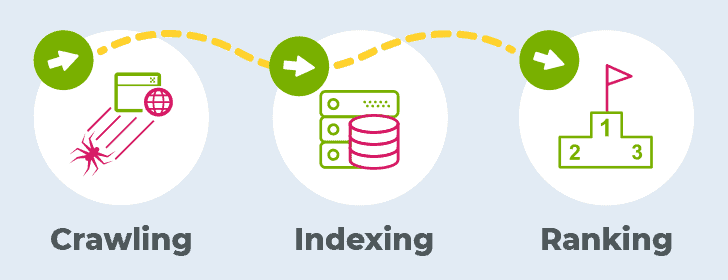
Image source : https://www.tst.net/how-does-google-search-engine-work-learn-the-basics/
You can improve your website’s performance with a complete SEO checklist, which is designed to increase your online visibility and ranking.
- SEO Basics
SEO (Search Engine Optimization) is a time-tested process of website optimisation and content to rank higher in search engine results. The key to SEO is to use relevant keywords; nonetheless, the structure of the site and speed of the pages are crucial. Nobody likes to delay while they are on the web.
Also, without high-quality content, people wouldn’t stay longer on your website. Creating backlinks from reputable sources and a positive user experience are both crucial for SEO. To achieve these goals, it’s essential to utilise the best SEO tools available online.
The ultimate goals of SEO strategies are :
- Increase brand visibility on search engines
- Drive Organic Traffic
- Improve online presence and reach
- Keyword Research
The process of identifying and selecting the most relevant keywords that would drive traffic to your website is known as keyword research. It involves, basically, the search terms and phrases that potential users might use when searching for information or products online. By using this keyword, businesses optimise their content to reach their target audience better and improve their website’s visibility in search engine results.
- SEO Content
There can be many forms of content that are available online, but almost each one of them can be optimised. SEO content generally refers to web content, including articles, blog posts, and product descriptions. It also entails a variety of tasks, including the use of relevant keywords.
When developing SEO content, one crucial factor to consider is “how long should a blog post be?” as this might affect its effectiveness. By using this keyword, businesses optimise their content to improve their website’s visibility in search engine results and reach their target audience better.
- On-Page SEO
Optimising each web page is known as On-Page SEO, which is basically done to improve search engine rankings and organic visibility. This includes optimising content, meta tags, headings, images, and URLs, as well as improving page speed and mobile friendliness, all to enhance the user experience and search engine visibility.
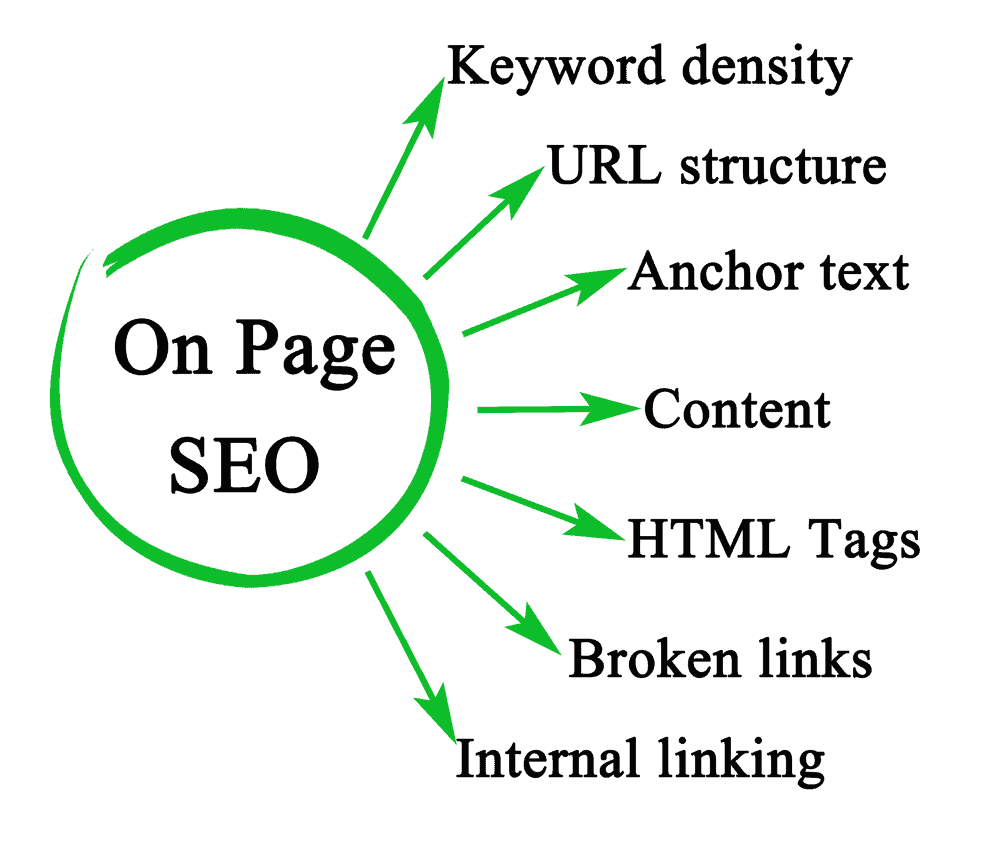
- Off-Page SEO
It refers to activities and strategies that are done outside your website to improve its search engine rankings and online authority. The Off-Page SEO includes building high-quality backlinks, social media engagement, and online reputation management to enhance your website’s visibility in search results.
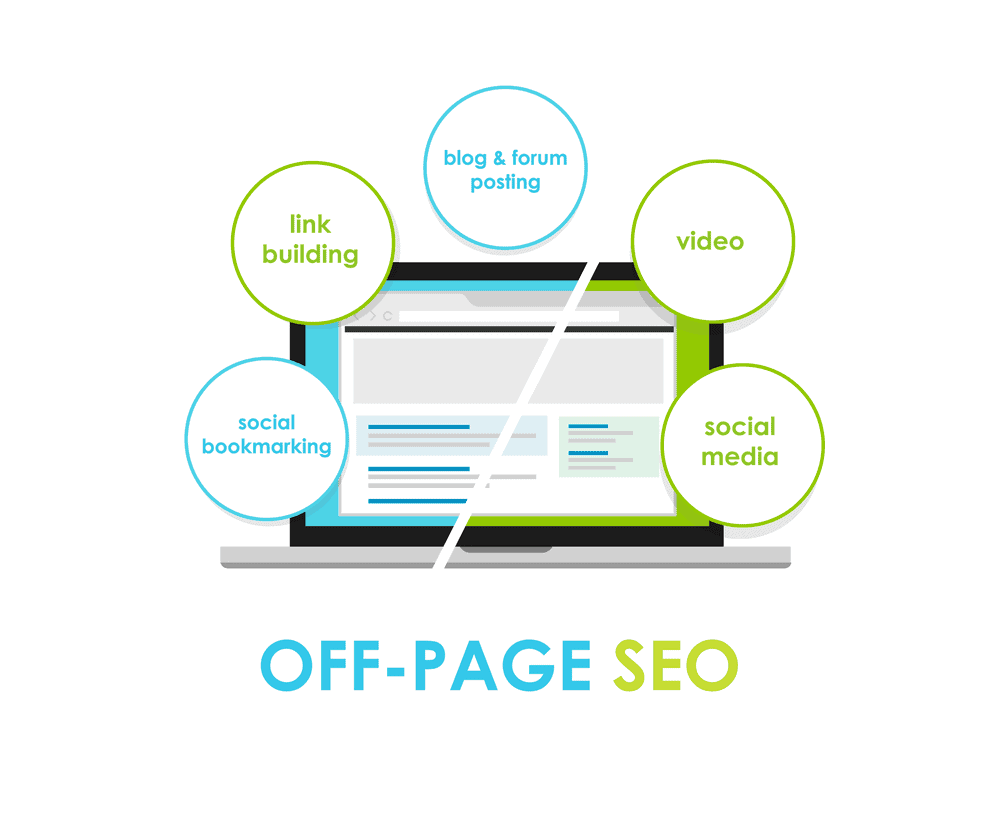
- Advanced Link Building
It involves using sophisticated strategies to acquire high-quality backlinks from authoritative websites, which enhances your website’s credibility and search engine rankings. Advance link building includes guest posting, influencer outreach, and content partnerships to establish your site as a trusted resource in your niche.
- Technical SEO
Technical SEO is the best of the lot. It involves optimising the technical areas of a website to improve its search engine visibility.
Technical SEO includes:
- Reducing image size to optimise site speed,
- Improving mobile-friendliness,
- Improving user interface,
- Enhancing website structure
- Ensuring proper indexing to create a more search engine-friendly website.
What Does SEO Bring to the Table?
- It gets better results and is cost-effective in the long run
The difference between SEO and PPC is that, as opposed to PPC or other paid advertisement marketing strategies, SEO is considered an economical long-term investment that gives better results. With PPC, once you stop investing financially, the visitors stop. So, it only works as long as you have the money to fuel it. That is not the case with SEO.After a successful implementation of an SEO campaign, you will continue to get more visitors. It will also be effective for a long time, even after you have stopped using SEO. - Steady flow of high-quality organic traffic
While most digital marketing strategies require continuous monitoring, SEO is one of the rare few that can last a long time without much interference. After implementing an SEO strategy, your website will continue to rank for keywords as long as they are relevant.For your content to remain relevant, you have to continuously update it, providing solutions to a user’s search query. The takeaway here is that a well-targeted and intelligent SEO campaign can get you a steady flow of visitors for years. It will probably also bring repeat visitors who are satisfied with your services.
Things to Know About SEO
- It takes at least 2-6 months to see resultsAccording to SEO Experts, it takes at least 2-6 months to see the changes brought on by SEO. This statement is true for websites that generally have authoritative links and rich content. SEO just ensures that the content is reaching the right audience.If the website has little to no content or poor quality content, it would take longer to revamp it and get any results from SEO. Read to know why content length is important for SEO.SEO would not be suitable for businesses that are looking for immediate results. It could take months and is ideal for businesses interested in creating and establishing their brand.
- Finding a subject-matter expert for enriching website with valuable contentContent is one of the key aspects of making SEO work. Without quality content, SEO would flounder, and there would be nothing to work with. Similarly, without SEO, even quality content might have a hard time reaching the desired audience.It is why you need to build authoritative content. Building authoritative content usually equates to finding a Content Marketing company in Mumbai with expertise on a subject pertaining to your niche. Many businesses, by their nature, require to publish content frequently. Such businesses might do well with hiring an in-house writer, which means increasing your budget to accommodate them.You could also choose contractual content creators who’ll create relevant and valuable content for your business. Creating content could also involve practices such as interviewing experts for their input, which might be a bit expensive for businesses with limited budgets.
PPC: Pay Per Click
What is PPC?
PPC, short for Pay Per Click, is a paid marketing strategy where advertisers have to pay a fee whenever one of their advertisements is clicked on. Investing in PPC services is similar to investing in online advertisements.
We’ll use the Google search results for Investment Opportunities to elaborate on the workings of PPC. One of the most frequent questions we get is, how much does Google ads cost?
It can vary widely depending on several factors, but when it comes to the PPC model, it means you’re charged when someone clicks on your ad, giving you control over how much you spend in total each day.
All three top-ranking search results for the query Investment opportunities have the AD tag attached at the top corner. These are paid advertisements. An agency offering PPC services in Mumbai can help you maximise your ROI on PPC strategies.
Suppose you click on the first link: Jiraaf.com. For you, it will be as simple as visiting another site. But here’s how it will work for the owners or marketers at Jiraff.com. When you click on their ad, jiraff.com will have to pay a fee for receiving you as a visitor.

When done right, PPC can give a great return on investment. Typically, the costs of PPC vary based on competition for a particular keyword. It is one of the metrics that PPC marketers have to consider while building a PPC campaign.
Your PPC campaign creator will have to build a targeted landing page that offers valuable content. Search engines tend to favour advertisers that offer relevant content by reducing the fee they have to pay for the clicks. This, in turn, factors into your profits.
To get optimal results, it is best to work with a reputed PPC service provider in Mumbai as they are aware of all the ins and outs of PPC advertising.
What Does PPC Bring to the Table?
- Instant Results: start getting visitors right away
If your goal is to get visitors to your website for a specific deal or offer, PPC would be the ideal marketing strategy. It is well-suited for short-term projects with a promise of high ROI. Even a non-technical person who has no idea of the workings of PPC could get started by watching a video on YouTube. On the basic level, it is simple to do.
But is it simple to do well? Not at all!
If you mess it up, instead of reaping benefits, you would be shelling out additional cash that you didn’t factor into the budget. That’s why you need a PPC expert to plan a smart PPC campaign.
When you invest in PPC advertising, letting an expert guide you through the process will bring you instant results that will last as long as your budget runs.
- With PPC, you have more control over people you target
Every PPC platform allows you to select an audience. Your audience is the people who will be seeing your advertisement when they enter the keyword into the search field. While many PPC platforms offer a ready-made audience, recommended for your preference, you have the choice to narrow it down with demographics and geographic data.
For example: let’s assume that you own a flower store and have a plan to offer deals for the coming Valentine’s day, which is in 3 days.
With PPC, you get the choice to actually select an audience with desired marital status. For Valentine’s day, you might want to narrow it down to people who are married and in a relationship. You can create an advertisement featuring your Valentine’s day deal and run the advertisement for at least 2 days.
It is just one example of how you can target a very specific audience with PPC. It also allows you to experiment with the targeting until you do it right. You can invest the lowest possible amount to experiment with the keywords, and run an advertisement for a day to see how it works live.
Also, consider the date when you’ll be publishing the ad campaign. If you publish Valentine’s day flower deals on Valentines day and the day before it, you’ll get optimal ROI. But if you publish the same ad on other days, it would not receive much traffic.
Things To Know about PPC
- Needs a constant money flow to work optimally
Of the two choices we have here, PPC is more expensive. Ads platforms rank PPC adverts based on several factors such as keywords and valuable copy.
When you want your business to rank for competitive keywords, it’s highly probable that other businesses within the same niche are already ranking for the keyword.
Google and other search engines prioritise rankings based on keywords and relevance. Your competitor’s PPC advert will rank higher if their quality score is higher than yours.
But if you are going head to head with your competitor, search engines have to resort to the bid amount. It is the amount you invest in PPC advertisements. Businesses that have set a higher bid amount are given preference in such cases.
Understanding how it works will help you understand why a good PPC budget is essential for the survival of your PPC strategy. When you stop the advert, the money stops flowing, and your website loses the top position.
- With PPC, you have to work with new advert ideas
Investing in PPC long-time could get expensive, and the advert that once got many hits might not work the same. Once people get used to a certain type of advertisement, their eyes glaze over, and it doesn’t register to them anymore.
To hold your audience’s interest, you have to continuously innovate and come up with new ideas that will keep your audience engaged for a while. It is one of the reasons why PPC is good for short-term and quick results. In the long run, you have to be very smart. The key is to update your landing pages or advertisements to make them more enticing to your prospective visitors.
Pros and Cons Comparison
To help you navigate these two strategies effectively, let’s delve into SEO versus PPC.
Pros of SEO
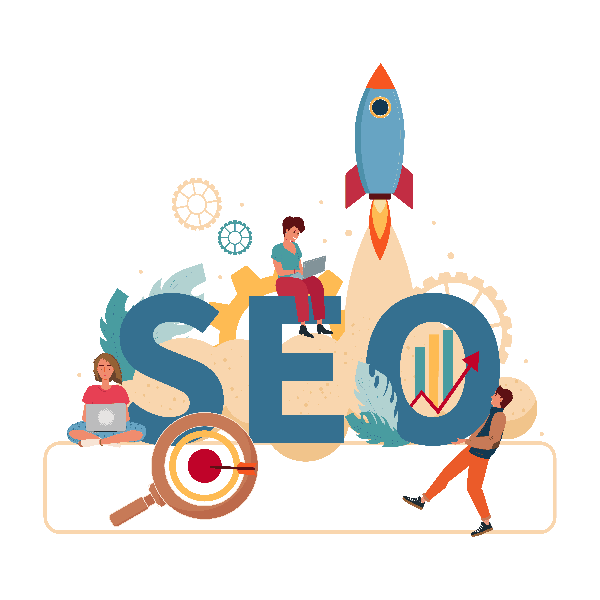
- Organic Traffic in the longer term
SEO efforts yield long-term results; it helps you get sustainable organic traffic over time without ongoing ad spend.
- Credibility and Authority
Ranking higher in the search results conveys credibility and authority to users. You can consider using a Google rank checker for the same.
- Cost-Effective
Compared to PPC and other paid advertising, it is a cost-effective way to drive traffic.
- Broad Visibility
If you have been wondering why your website is not showing up on Google, you can consider implying SEO. It can help you rank through multiple keywords and search phrases, making your website appear in a wide range of search queries and increasing visibility.
- Evergreen Content
With SEO, the traffic is not one-time; well-optimized content can continue to attract visitors for extended periods.
- Less Intrusive
Unlike other forms of advertising, SEO only provides information when a user seeks it, making it less intrusive.
- 80/20 Rule
Often, most of the organic traffic comes from a minority of well-optimized pages.
Cons of SEO
- Slow Results
Typically, SEO takes significant time to see results, which in turn can be frustrating for businesses seeking quick wins.
- Algorithm Changes

Image Courtesy: Google Search Central
Search engine algorithm keeps on updating, and too frequent updates can impact rankings and require ongoing adjustments.
- High Initial Investment
While SEO might not have any recurring expenses, it requires a substantial initial investment in content creation, optimisation, and link-building.
- Uncertain ROI
Predicting the exact Return On Investment (ROI) of SEO efforts can be challenging due to various factors affecting search rankings.
- Competitive Landscape
SEO can be highly competitive, especially in popular niches, making it harder to rank.
Pros of PPC Advertising

Image Courtesy: Google Ads
- Immediate Visibility
PPC is more like a quick fix. It provides immediate exposure to your target audience, as ads appear as soon as campaigns are live.
- Precise Targeting
You can reach your target audience using specific demographics, locations, and keywords, all of which ensure your ads reach the right audience.
- Control Over Budget
You have full control over the budgets, be it daily or overall, preventing overspending.
- Quick Results
A well-planned PPC campaign can generate fast results in terms of desired objectives, be it driving website traffic or conversions.
- Measurable Results
Unlike other forms of marketing, PPC offers clear and measurable metrics, allowing you to track cost benefits accurately.
- Flexible Campaigns
You can easily adjust and optimise your ad campaigns based on performance.
- A/B Testing
Last but not least, you can run A/B tests to refine ad copy, keywords, and landing pages for better results.
Cons of PPC Advertising
- Ongoing Costs
PPC advertising requires continuous investment, and results stop when the campaign is paused.
- Ad Fatigue
Repeated ads might bore users, and they may become fatigued or start ignoring ads, affecting click-through rates.
- Competition
High competition for popular keywords can drive up costs and reduce ad visibility.
- Learning Curve
Successfully managing PPC campaigns may require expertise and time to learn the intricacies of the platforms.
- Limited Credibility
Some users may trust organic search results more than paid ads, affecting credibility.
Optimizing the Synergy Between SEO and PPC Strategies
SEO and PPC combined give businesses a holistic digital marketing approach that leverages the strengths of each channel and complements each other to achieve their overarching marketing objectives. Combining the best of both PPC and SEO strategy can be a powerful digital marketing strategy. Listed below is how you can combine both to get the best results:
- Identifying Common Goals
The base to start with any marketing strategy is to identify common goals. Both SEO and PPC efforts should be aligned with common goals, such as increasing website traffic, conversions, or revenue.
- Keyword Research and Targeting
You need to undertake comprehensive keyword research to identify high-performing keywords for both SEO and PPC. These keywords need to be coordinated to maximise visibility.
- Crafting Unified Messaging
Both marketing messages should be consistent. Your PPC ads and SEO-optimized content should speak the same language and reflect your brand’s value proposition.
- Using Data Insights to Refine Strategy
The data generated from both strategies needs to be continuously analysed and monitored. You can use insights to refine strategies, reallocate budgets effectively, and further optimise keyword targeting.
- Leveraging Retargeting and Remarketing
An effective marketing plan will retarget users obtained from organic content and re-engage users who’ve already visited the website.
- Monitoring and Optimization
Regularly monitoring the performance of both SEO and PPC efforts is essential, as the insights generated will help to adjust strategies, keywords, and budgets based on real-time data to achieve the best results.
Which is Better for Sales, Conversions, & ROI?
Why would investing in SEO be the best choice for your business?
To decide between seo vs ppc which is better, first, you have to figure out what you want out of your investment.
- Are you looking to bring more quality visitors to your website?
- Or are you interested in refining your audience, and narrowing down the profile to visitors who’ll convert easily?
Both SEO and PPC can help with these, but SEO is better at getting you organic results. It will help reduce the budget for digital marketing, and you can feed that money into your business.
When you choose to hire an agency for SEO audit in Mumbai for your business, you are likely to get a comprehensive understanding of what needs to be changed and improved in your website. It will also help you find and incorporate targeted keywords. As long as your content is relevant to the keywords, they’ll show up on people’s search results.
The growing digital awareness will also help build credibility and trust. It will help build a nascent bond between you and visitors, which can be strengthened by delivering effective services.
Remember that while advertisements have a place at the top of organic results, they are ignored by many users. It is where organic search results reign.
While building an SEO campaign can cost you, it is one of the most affordable digital marketing strategies. The results of SEO for small business are generally favourable, providing an increased ROI.
Also, even if, for some reason, you have to discontinue your SEO efforts, it doesn’t take away all the hard work. Your website will continue to rank for those keywords until other websites with more valuable content show up.
Typically, the click-through rate for organic results is higher than that for paid results. So, overall, with SEO, you get more clicks.
Why would investing in PPC be the best choice for your business?
With PPC, your business will always be on the top, above the fold. Even with all the benefits of SEO, PPC still has its influence over the users. While many users may choose to scroll past the advertisements on the top, they are still visible.
We have already seen a few key benefits of PPC, now we’ll talk about a few more. PPC helps target ads to people who are interested in your services. It helps you narrow down the audience in the ad settings. Recently, Google has also started showing visual product ads above the fold.
If you were to search for floral scarves on Google, you might see similar results:

The user who entered the search query wanted to find new floral scarves. So now, instead of scrolling through countless pages that speak about why floral scarves make the best accessories, they can head over to the products and buy them directly.
This is why above the fold ads are beneficial. When done right, they can bring you results. These above the fold visual ads are better at conversion than affiliate marketing which needs SEO to flourish.
PPC has scope for experimenting. It helps you test your products or marketing messages with a short controlled campaign. With PPC, you can control how much you want to spend. While PPC may seem like an expensive affair, the costs can be brought down to a certain degree.
The downside of PPC, as we have mentioned quite a few times, is it tends to be expensive, and once you stop advertising, your visibility goes away.
SEO vs PPC: 10 Questions to Ask Yourself
When you answer these questions, you can decide whether to prioritise SEO, PPC, or a combination of both in your digital marketing efforts. The choice should align with your goals, budget, audience preferences, and risk tolerance.
- What are My Immediate Goals?
While SEO is suitable for long-term organic growth and visibility, PPC can get you quick results and immediate visibility.
- What’s My Budget?
SEO requires ongoing investment, and the returns are delayed, whereas PPC allows for tighter budget control with ongoing costs.
- Do I Want Long-Term Visibility?
If the plan is to get long-term sustained organic visibility, SEO is the way. PPC, on the other hand, provides instant paid visibility but only while ads are active.
- How Competitive is My Industry?
If the space is competitive, organic ranking will be hard to attain. PPC, on the other hand, might be more effective in a crowded market.
- Am I Willing to Learn and Invest Time?
No doubt, SEO requires ongoing learning and effort for optimisation, and PPC involves campaign management and continuous monitoring till the time ads are active.
- Do I Want Total Control Over Spending?
SEO yields results over time hence, the budget is more fluid, and ROI realisation takes time. PPC offers precise control over ad spend and immediate results.
- Can I Benefit from Both Strategies?
Yes, combining SEO and PPC is a balanced approach. You can utilise SEO for long-term growth and PPC for quick wins.
- What’s My Target Audience?
What does your target audience prefer to do? Do they prefer organic search results or paid ads? You can customise your strategy based on audience behaviour.
- Do I Need Data for Quick Decisions?
PPC provides instant data for optimising campaigns, while SEO insights are gradual and may require more patience.
- What’s the Level of Risk Tolerance?
SEO carries the risk of algorithm changes impacting rankings PPC offers more predictable and controllable results.
Should you invest in both SEO and PPC?
Ideally, it would be a great idea to invest in both. Since both have distinct benefits, the results of putting them together could do wonders for your website.
Use social media PPC adverts to build awareness about your published content, as blog posts published with SEO strategies don’t go viral overnight. As we have seen, SEO takes at least two months to create any impact. Meanwhile, you can share an advert for PPC to speed up brand visibility.
Before investing in a long-term SEO strategy, consider testing your keywords with PPC. When you run a PPC campaign, you get access to keywords and conversion data, which can be used for organic search as well.
When you have such essential information at hand, you can move the expensive keywords to organic search. It would significantly lower your marketing costs. Access to such data can also help you determine the keywords your competitors are ranking for, and you can exploit this information to create a better campaign for your brand.
Suppose your website has a blog that receives many visitors, but not all of them subscribe to your offers or deals. It doesn’t necessarily mean they aren’t interested. Retargeting can help you get them back on board. You can create a PPC advert targeting this audience, reminding them of the offers.
Want to Skyrocket Your Online Presence? Connect Now!
Call Us Now on +91 98330 94626 (Sales) or WhatsApp Us or send us an email to hello [at] capsicum [dot] in to discuss your project further!
- 45+ Strong Member Team.
- 650+ Clients Served Globally.
- 15+ Years of Experience.
- 23+ Int’l Countries Served.
Final Thoughts
Regardless of which one you choose for your business—PPC or SEO—they share a common problem. One of the pitfalls of keyword targeting is the competition for top-ranking keywords.
Suppose you want to start a boutique in your region, but most top-ranking keywords are dominated by retailers like Amazon, Flipkart, and Walmart. It can be difficult to rank for such competitive keywords, and this is when you need some out-of-the-box thinking.
A Digital Marketing Agency In Mumbai can make your website rank higher, as it can help you figure out how to improve the performance of your business website and help you come up with ways to rank your website higher on Google.









